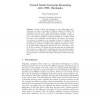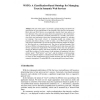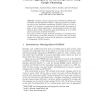112
Voted
ESWS
2006
Springer
15 years 6 months ago
2006
Springer
Abstract. Despite of their advertisement as task independent representations, the reuse of ontologies in different contexts is difficult. An explanation for this is that when devel...
117
Voted
ESWS
2006
Springer
15 years 6 months ago
2006
Springer
We present a new iterative algorithm for ontology mapping where we combine standard string distance metrics with a structural similarity measure that is based on a vector represent...
126
Voted
ESWS
2006
Springer
15 years 6 months ago
2006
Springer
Classifications have been used for centuries with the goal of cataloguing and searching large sets of objects. In the early days it was mainly books; lately it has also become Web ...
111
Voted
ESWS
2006
Springer
15 years 6 months ago
2006
Springer
In the extensive usage of ontologies envisaged by the Semantic Web there is a compelling need for expressing mappings between the components of heterogeneous ontologies. These mapp...
130
Voted
ESWS
2006
Springer
15 years 6 months ago
2006
Springer
Abstract. Many approaches for RDF stores exist, most of them using very straight-forward techniques to store triples in or mapping RDF Schema classes to database tables. In this pa...
121
Voted
ESWS
2006
Springer
15 years 6 months ago
2006
Springer
Functional descriptions are a central pillar of Semantic Web services. Disregarding details on how to invoke and consume the service, they shall provide a black box description for...
110
Voted
ESWS
2006
Springer
15 years 6 months ago
2006
Springer
We present a comprehensive approach to ontology evaluation and validation, which have become a crucial problem for the development of semantic technologies. Existing evaluation met...
121
Voted
ESWS
2006
Springer
15 years 6 months ago
2006
Springer
The aim of this paper is to provide a general ontology that allows the specification of trust requirements in the Semantic Web Services environment. Both client and Web Service can...
112
click to vote
ESWS
2006
Springer
15 years 6 months ago
2006
Springer
We present an architecture for combining wikis containing hypertext with ontologies containing formal, structured information. A web-based ontology editor that supports collaborati...
103
Voted
ESWS
2006
Springer
15 years 6 months ago
2006
Springer
Recently, research projects such as PADLR and SWAP have developed tools like Edutella or Bibster, which are targeted at establishing peer-to-peer knowledge management (P2PKM) syste...



